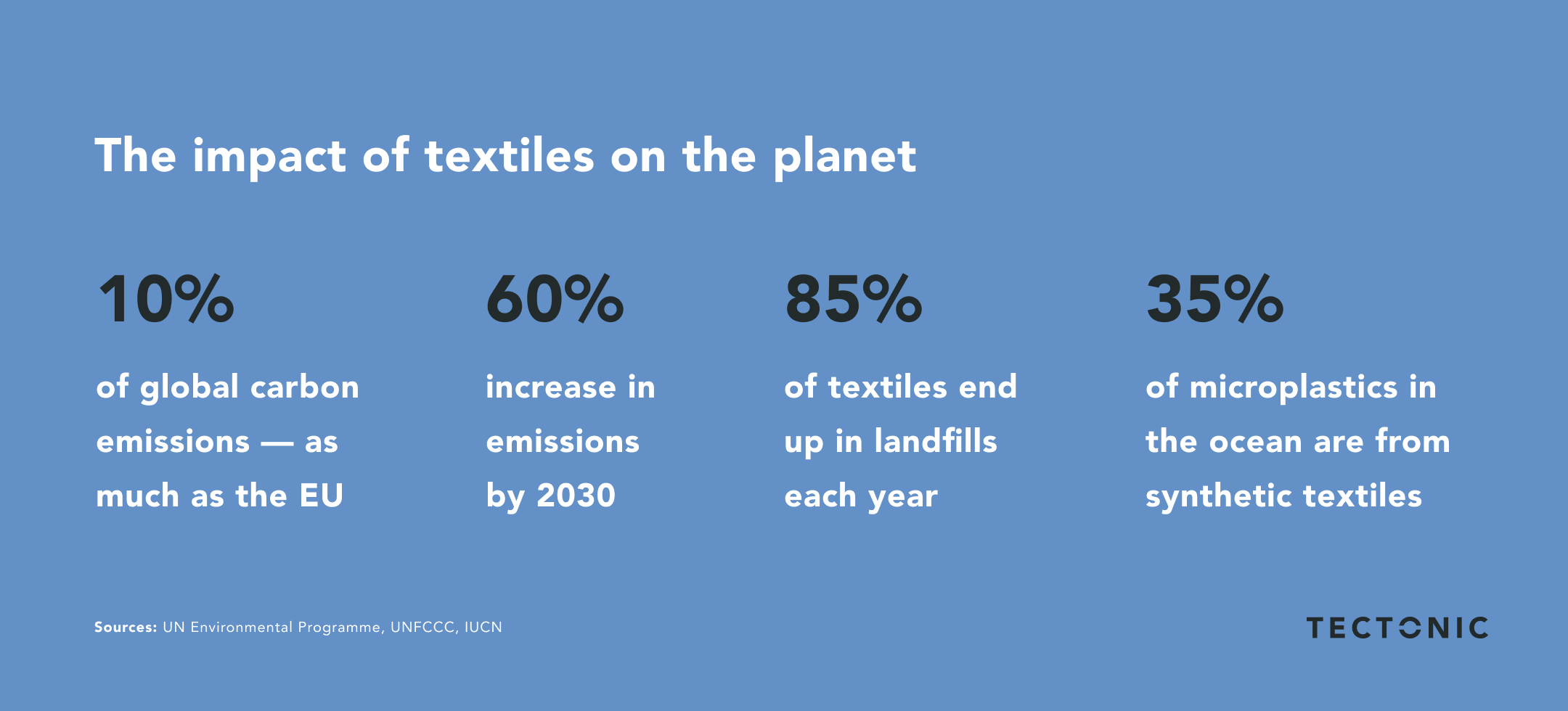In this week's brief, we're looking at start-ups reducing the fashion industry's impact on the environment, the costs of climate change for insurance companies, and the United Kingdom's efforts to scale renewable energy deployment.
Startup raises $33 million for lab-grown cotton: Boston-based start-up Galy has raised $33 million in Series B funding, led by Bill Gates's Breakthrough Energy Ventures with participation from Zara parent company Inditex, H&M, Amazon and Google investor John Doerr, and Sam Altman's Hydrazine Capital. The startup aims to tackle the immense amount of resources the fashion industry uses, where it can take 715 gallons of water to grow enough cotton for a single t-shirt. Galy's cotton originates from real cotton plants, retaining its structure and attributes, but uses 99% less water and 97% less land and emits 77% less carbon. The company also has a roadmap for reaching price parity with traditional cotton.
Alternative materials are in fashion: A series of startups are reducing fashion's impact on the planet and embracing processes to improve the environment. INVERSA is partnering with 40 brands to produce leathers using the skin of invasive lionfish, which are decimating reef ecosystems in the Caribbean, Atlantic, and Gulf of Mexico. TômTex is making fully biodegradable capsule collections using food waste from shrimp, crab, and lobster shells to produce materials that perform like leather, silicon, and vinyl. And Natural Fiber Welding, which has raised $185 million and is currently pursuing Series C funding, is making natural materials for BMW, VivoBarefoot, Stella McCartney, and Ralph Lauren.

Insurers face billions in climate losses: A new report from modeling firm Verisk forecasts average annual losses of $151 billion from natural disasters. The analysis pointed to the impact of climate change, the rise of populations exposed to risk, and inflation in rebuilding costs as significant drivers of the rise in anticipated losses.
Cities embrace Google AI tool to combat heat: Fourteen cities are piloting the new Heat Resilience tool from Google that leverages AI to analyze satellite and aerial images to assess the amount of shade provided by trees and the presence of cooling reflective roofs. City officials can then tweak models to understand the added impact of additional interventions. In certain neighborhoods in cities like Miami, temperatures can be 12 degrees warmer due to urban infrastructure like roads, parking lots, and buildings absorbing and releasing extra heat.
Britain advances energy transition: The British government awarded support for 131 renewable energy projects, including offshore wind, solar, and tidal power. The projects could unlock $18 billion in investment and power nearly 11 million homes if completed. The announcement included price support for 10 offshore wind farms with 5 gigawatts of power capacity to maintain their viability as the country seeks to quadruple offshore wind by 2030. The United Kingdom will also become the first G7 country to stop using coal power when it retires its Ratcliffe plant later this month. This marks a significant milestone for a country that was home to the world's first coal-fired power station, which opened in 1882 in London.
Energy Department works to deploy clean-energy loans: The Inflation Reduction Act created a $400 billion clean-energy lending program under the Department of Energy. So far, the office has agreed to lend about $6.5 billion to five companies, made another $24.9 billion in commitments that haven't received final approval, and has more than 200 active applications for an additional $281 billion in loans. Delays in deployment include requirements that applicants receive private investment before disbursement of the federal loans, rigorous due diligence, higher interest rates, and slowing growth of electric vehicle sales. With the election looming, many companies are uncertain about the prospects of the continuation of the funding.
Netflix works to cut emissions: Netflix aims to cut the company's emissions in half by 2030, but has made little progress since committing in 2020. Much of the work has focused on reducing emissions on the company's film and TV production, which account for half of its overall emissions but is managed mainly by outside studios and vendors. This includes using solar-powered trailers for talent on the set of Stranger Things in Atlanta and a hydrogen power unit for the Bridgerton set in London. The bulk of the company's progress has come from purchasing renewable energy.
Arguing in favor of geoengineering: In an oped in the Financial Times, Pascal Lamy, the former Director General of the World Trade Organization, makes the argument that with the risks for climate catastrophe already high and rising quickly, it is time to explore further geoengineering, specifically solar radiation modification (SRM). The technique can involve releasing tiny particles into the upper atmosphere to scatter sunlight or marine cloud brightening with seawater to increase the reflectivity of low-lying clouds. Lamy notes the process is not without its risks, including disruptions to regional weather patterns and harm to the ozone layer, and does not address the underlying issue of carbon dioxide levels. To mitigate the downsides, Lamy argues for a global governance framework, a moratorium on large-scale experiments until further assessment has been conducted, and expanded research on potential impacts, all of which can be advanced at next year's COP30.
The climate impact of data centers: Morgan Stanley estimated that the global growth in data centers means the industry will produce 2.5 gigatons of carbon dioxide emissions through the end of the decade — roughly 40% of what the United States emits yearly. The research noted that should the leaders in the space, including Google, Microsoft, Meta, and Amazon, maintain their climate commitments, this growth could lead to significant investments in decarbonization efforts, including clean power development and carbon capture.


